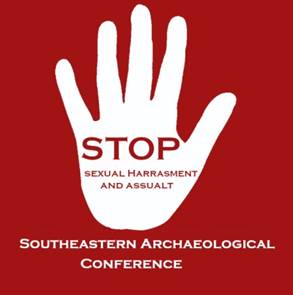SEAC Task Force on Sexual Harassment and Assault

According to SEAC policy, sexual harassment and assault are classified as scientific misconduct because such conduct causes harm to, interferes with, or sabotages scientific activity and careers. Sexual harassment and assault creates a hostile environment that reduces the quality, integrity, and pace of the advancement of science by marginalizing individuals and communities. It also damages productivity and career advancement, and prevents the healthy exchange of ideas (adapted from the American Geophysical Union).
Archaeologists’ learning and work environments are the context not only for the many duties of professionals in our field but also for cultivating confident and effective future generations of archaeologists. Today, archaeologists have many roles: instructional staff and students in classroom, lab, and field settings; curatorial staff in non-profit and government museums; cultural heritage managers and educators in governmental, tribal, and public utility settings; supervisors and employees in private cultural resource/heritage management firms; and participants in professional meetings and conferences. All of these contexts bring practitioners into contact with members of an increasingly diverse population of students, employees, and colleagues.
The Southeastern Archaeological Conference places high value on assuring that educational and work experiences in archaeology are optimal for all to develop and practice relevant skills and knowledge. Sexual harassment and assault, and any form of intimidation based upon sex, gender identity, sexual orientation, ethnicity, disability, national origin, religion, or marital status has been legally recognized as having a chilling effect on learning and workplace experiences, not only for the targets of such behavior but also for others witnessing it. SEAC will not tolerate such behavior.
If You Have Been Sexually Harassed or Assaulted
SEAC has taken steps to actively promote awareness of the issue of sexual harassment and assault and to help educate and move the membership toward a healthier environment in regard to the prevention of sexual harassment and sexual assault of its members.
To report a sexual harassment complaint that occurred at any SEAC-related event, please consult the SEAC Process for Reporting, Investigating, and Adjudicating Sexual Harassment Complaints. Please note that SEAC does not adjudicate incidents of sexual assault which is a criminal act and should be reported to law enforcement. However, the SHARP Committee stands ready to aid complainants who wish to report incidents of sexual assault.
In addition, SEAC has established a resource guide with the appropriate offices in university, state, and federal agencies to whom one can report a violation. Please keep track of our progress in meeting these goals on this website.
SHARP Coordinator Executive Board Position
The Task Force is pleased to announce that the members of SEAC, in the fall of 2020, voted to implement a permanent Executive Committee position of a Sexual Harassment and Assault Response and Prevention (SHARP) Coordinator. The SHARP Coordinator will be responsible for coordinating and implementing all SEAC initiatives, actions, or oversight deemed appropriate by the Executive Committee regarding the prevention, mitigation, and response to sexual harassment and assault. To assist in this difficult work, the Executive Committee will also appoint a SHARP standing committee, chaired by the SHARP Coordinator. This initiative required a change in SEAC Articles of Incorporation and By-Laws; you can view the changes in Appendix A of the 2020 SEAC Task Force Report.
The SHARP Coordinator is an elected, two-year position, and in 2021 Carol Colaninno-Meeks was elected to the position. Dr. Colaninno-Meeks has now assembled a SHARP Committee consisting of Mikayla Absher, Cindy Carter-Davis, Robbie Ethridge, Shawn Lambert, Grant Stauffer, and Lauren Walls. Contact information for Dr. Colaninno-Meeks and the SHARP committee members is below.
SEAC Policy Statement on Sexual Harassment and Assault
2024 Upcoming SEAC SHARP-sponsored events
February 2024 SHARP Virtual Workshops
SEAC Meetings Code of Conduct 2024
SEAC Safe Officer Program 2024
Safe and Inclusive Field Schools—NSF-funded Project
Colaninno, et al., “Creating and Supporting a Harassment- and Assault-Free Field School.” Advances in Archaeological Practice 8(2): 111–122, 2020. Link to paper.
Colaninno, et al., “Preventing and Reducing Occurrences of Sexual Harassment and Assault at Archaeological Field Schools.” Paper presented at the National Academies of Science, Engineering, and Medicine Action Collaborative on Preventing Sexual Harassment in High Education, October 19, 2020, online format. Link to paper; link to associated PowerPoint.
SEAC 2014 Sexual Harassment Survey
2018 The Context and Consequences of Sexual Harassment in Southeastern Archaeology Advances in Archaeological Practice article by Meyers et al interprets the facts that 66% of archaeologists reported harassment and 13% reported assault. The authors also discuss changes over time, correlations between particular factors, effects on careers, and efforts at mitigation.
Unformatted Survey Data Question/Response
Formatted Survey Data Question/Response
Resources for Mitigating and Preventing Sexual Harassment and Assault
For immediate help, call 911, local police can accompany you to a local hospital or health center. There is no time limit on making a police report and filing a report does not mean you have to press a criminal case.
Employees at your school or work place are generally required to report conversations if you tell them you have experienced harassment or assault. Reporting to the Dean of Students or Title 9 Compliance & Equity Officer at your university means you will be protected from retaliation.
If you wish to have an anonymous conversation rather than make a report, each state has a sexual assault hotline and the National Sexual Assault Hotline 1-800-656-HOPE will connect you with a local resource. You may also try 877-739-3895 for the National Sexual Violence Resource Center. Universities often offer free counseling or other places to anonymously discuss sexual assault and harassment. We are here to listen as well.
SEAC Resource Guide for Sexual Harassment and Violence
SEAC Suggested Code of Conduct for Field Schools and Field Projects
SEAC Suggested Agreement Form for Fieldwork Code of Conduct
SEAC Brochure on Sexual Harassment and Assault
SEAC Training Module on Sexual Harassment and Assault
SEAC Task Force and SHARP Yearly Reports
SEAC Task Force Report 2018
SEAC Task Force Report 2019
SEAC Task Force Report 2020
SEAC Task Force Report 2021
SEAC SHARP Report 2022
SHARP Coordinator and SHARP Committee Contact information:
Carol Colaninno-Meeks, SHARP Coordinator, Southern Illinois University at Edwardsville, ccolaninno@gmail.com
SHARP Committee:
Mikayla Absher, mikaylalaneabsher@gmail.com
Robbie Ethridge, rethridg@olemiss.edu
Shawn Lambert, sl2042@msstate.edu
Brian "BC" Cavanaugh, bcavanaugh@newsouthassoc.com
Laura Fuentes, lauraf@flateartharcheology.com
Ethan Mofidi: emofidi@ou.edu

